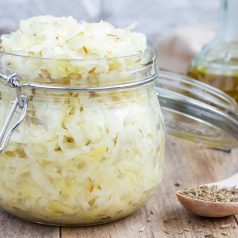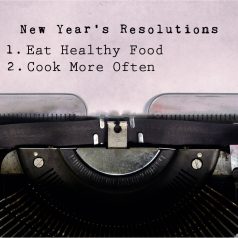
Sauerkraut
Sauerkraut is perhaps the best-known style of fermented vegetable in our country and also happens to be one of the simplest to make at home. The ingredient list is short, the steps are simple, and the margin for error is extremely low. In fact, famed fermentation revivalist Sandor Katz points out that the large population of lactic acid bacteria present in the ferment handily outcompete any incidental pathogenic bacteria, and the acidity that rapidly develops in fermented vegetables destroys any remaining pathogens. Lactic acid bacteria are present on cabbages and all other raw vegetables and they’re largely responsible for the magical transformation that takes place when you pack cabbage and salt together into a jar.
Our ability to use microbes — fungi (yeasts) and bacteria — as a method of food preservation dates back to the dawn of recorded history. Prior to refrigeration, it was the only way, short of sun-drying, to preserve food. It is a process that is inextricably linked to our culture as human beings. It is, in large part, responsible for our survival as human beings as it allowed our earliest ancestors to preserve and store food to get through long winters and periods of famine.
Fermentation also makes our food more nutritious, more flavorful, and easier to digest. Fermented foods deliver a healthy dose of living probiotic bacteria and enzymes to our overall intestinal flora, increasing the health of our gut microbiome. Even though the practice of fermentation has been around for centuries, we are just beginning to understand, from a scientific point of view, why fermented foods are so important for our health. The forty-odd trillion microbes that live on and in our bodies allow us to digest food and produce key minerals that nourish us and protect us from disease. They guide the development of our bodies, are key to the healthy functioning of our immune systems, and influence our behavior. They even modulate the expression of our genes, bind with and remove toxins from our bodies, prevent or lessen the effects of food allergies, and communicate with the nervous system using some of the same neurochemicals that relay messages to the brain (the Gut-Brain Axis). They secrete a profound number of chemicals, many of which are the same chemicals used by our neurons to regulate our mood and signal appetite clues like hunger and fullness.
Our weekly sale from April 21st – 27th celebrates foods that promote gut health, so what better time to try whipping up a batch of your very own probiotic-packed sauerkraut?

